
 i_need_contribute
i_need_contribute

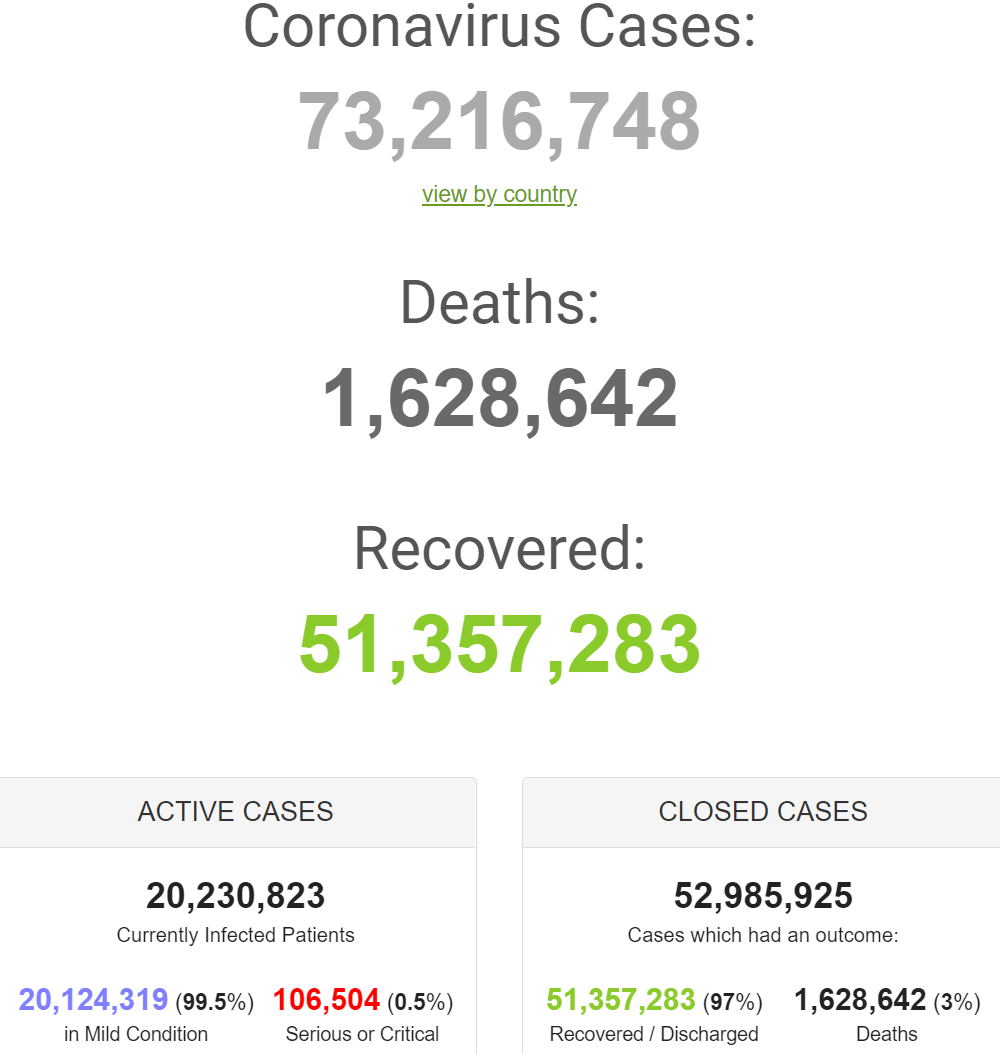
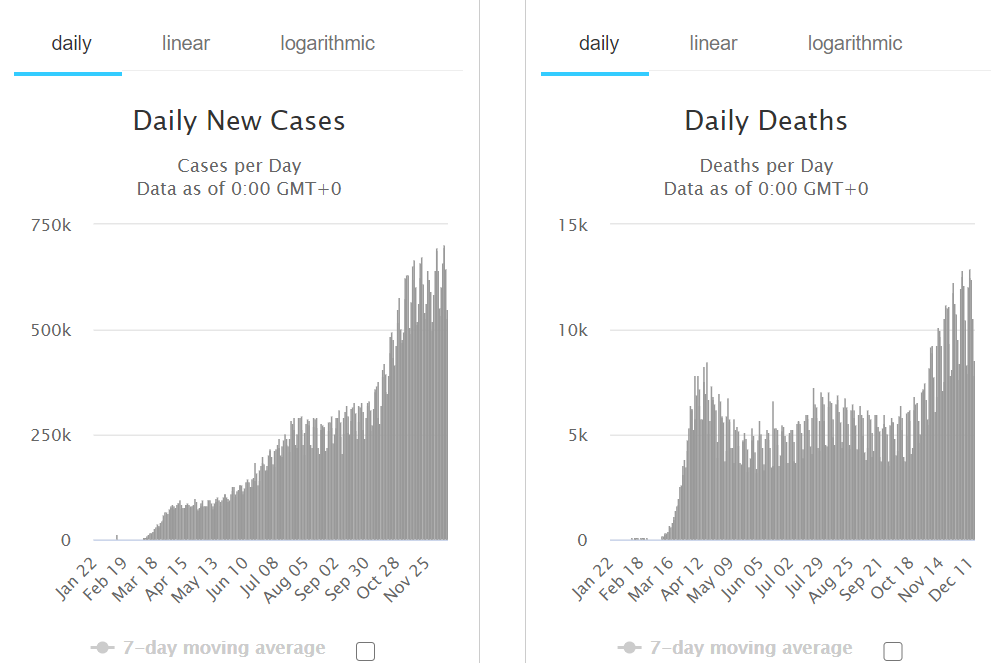
|
Country, |
Total |
New |
Total |
|
World |
73,181,495 |
+528,435 |
1,627,492 |
|
16,942,980 |
+198,805 |
308,091 |
|
|
9,906,507 |
+21,791 |
143,746 |
|
|
6,929,409 |
+27,419 |
181,945 |
|
|
2,681,256 |
+27,328 |
47,391 |
|
|
2,379,915 |
+3,063 |
58,282 |
|
|
1,869,666 |
+20,263 |
64,402 |
|
|
1,866,345 |
+29,617 |
16,646 |
|
|
1,855,737 |
+12,030 |
65,011 |
|
|
1,762,036 |
+7,967 |
48,013 |
|
|
1,503,222 |
+5,062 |
41,041 |
|
|
1,434,516 |
+8,742 |
39,195 |
|
|
1,357,141 |
+18,658 |
22,887 |
|
|
1,250,044 |
+8,608 |
113,953 |
|
|
1,140,572 |
+4,896 |
22,960 |
|
|
1,115,770 |
+7,501 |
52,447 |
|
|
986,130 |
+1,157 |
36,754 |
|
|
900,666 |
+6,451 |
15,247 |
|
|
866,127 |
+5,163 |
23,451 |
|
|
623,309 |
+5,489 |
18,956 |
|
|
621,944 |
+8,457 |
10,082 |
|
|
608,137 |
+2,171 |
17,951 |
|
|
581,082 |
+1,999 |
9,681 |
|
|
575,972 |
+1,338 |
12,603 |
|
|
573,830 |
+1,911 |
15,931 |
|
|
559,587 |
+3,252 |
13,494 |
|
|
492,332 |
+1,799 |
7,089 |
|
|
468,862 |
+8,119 |
13,553 |
|
|
450,704 |
+1,310 |
8,756 |
|
|
440,787 |
+2,362 |
8,832 |
|
|
400,826 |
+1,217 |
6,659 |
|
|
360,013 |
+125 |
6,059 |
|
|
359,506 |
+2,330 |
3,004 |
|
|
350,938 |
+2,194 |
5,649 |
|
|
325,051 |
+2,588 |
4,530 |
|
|
283,870 |
+3,470 |
7,130 |
|
|
271,364 |
+4,932 |
2,380 |
|
|
262,477 |
+2,863 |
3,407 |
|
|
249,244 |
+821 |
1,716 |
|
|
202,180 |
+70 |
13,875 |
|
|
194,619 |
+1,612 |
3,382 |
|
|
191,063 |
+1,337 |
1,839 |
|
|
186,041 |
+1,092 |
618 |
|
|
181,544 |
+2,095 |
5,838 |
|
|
179,653 |
+2,366 |
2,585 |
|
|
178,986 |
+3,112 |
1,966 |
|
|
177,358 |
+1,472 |
2,705 |
|
|
162,148 |
+1,853 |
1,273 |
|
|
Dominican |
155,184 |
+492 |
2,364 |
|
153,169 |
+549 |
1,936 |
|
|
148,682 |
+357 |
2,503 |
|
|
147,613 |
+1,093 |
1,210 |
|
|
147,150 |
+120 |
9,018 |
|
|
146,449 |
+231 |
912 |
|
|
142,325 |
+747 |
2,088 |
|
|
141,121 |
+160 |
241 |
|
|
133,489 |
+505 |
1,205 |
|
|
129,405 |
+123 |
4,445 |
|
|
127,253 |
+735 |
2,598 |
|
|
126,504 |
+264 |
1,472 |
|
|
125,173 |
+639 |
3,687 |
|
|
122,086 |
+511 |
6,943 |
|
|
117,242 |
+473 |
1,809 |
|
|
114,359 |
+316 |
2,975 |
|
|
113,095 |
+3,337 |
950 |
|
|
111,102 |
+1,364 |
1,000 |
|
|
109,512 |
+1,170 |
2,292 |
|
|
108,125 |
+339 |
960 |
|
|
96,745 |
+431 |
2,107 |
|
|
95,020 |
+1,920 |
825 |
|
|
94,223 |
+641 |
1,971 |
|
|
92,597 |
+495 |
2,609 |
|
|
92,055 |
+163 |
1,593 |
|
|
91,357 |
+578 |
1,314 |
|
|
89,268 |
+125 |
348 |
|
|
86,741 |
+16 |
4,634 |
|
|
84,846 |
+1,371 |
419 |
|
|
77,674 |
+318 |
1,312 |
|
|
76,449 |
+264 |
2,126 |
|
|
75,094 |
+138 |
612 |
|
|
73,851 |
+213 |
2,147 |
|
|
73,374 |
+199 |
1,197 |
|
|
58,325 |
+5 |
29 |
|
|
53,014 |
+81 |
327 |
|
|
49,191 |
+661 |
1,016 |
|
|
43,484 |
+718 |
587 |
|
|
41,900 |
+182 |
410 |
|
|
41,880 |
+249 |
1,205 |
|
|
41,803 |
+377 |
585 |
|
|
41,334 |
+331 |
393 |
|
|
5,359 |
+6 |
117 |
|
|
5,056 |
+7 |
46 |
|
|
4,237 |
+28 |
60 |
|
|
1,402 |
+5 |
35 |
Retrieved from: https://www.worldometers.info/coronavirus/
By Vikas Pandey
BBC News, Delhi
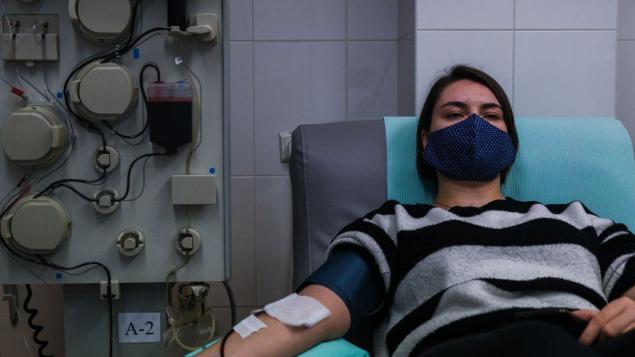
When people have Covid-19 or other viral diseases, their immune system responds by creating antibodies, which attack the virus. Over time the antibodies build up and can be found in plasma - the liquid portion of the blood.
India's health authorities, like many around the world, have allowed the use of plasma to treat severely ill patients as Covid-19 continues to claim lives. The therapy also requires the consent of patients and their families.
But doctors and researchers remain divided over its efficacy. The Indian Council of Medical Research (ICMR) recently warned against its indiscriminate use.
Its own study found that the therapy was not associated with stopping patients from becoming severely ill or reducing mortality.
Several studies around the world have reported similar findings. But the ICMR stopped short of banning the therapy.
"That shows that we can't discard plasma therapy yet," Dr Naresh Trehan, founder of Medanta Hospital, told the BBC. His hospital was one of the early adopters of the therapy in India and "has reported satisfying results".
Dr Trehan says that observational data from Medanta suggests that timing is a crucial factor in the therapy's success.
"Given at a time when a patient is between stage two and three of the cytokine storm, the therapy can be useful. It doesn't work when given in the late stage of the disease," he says.
A cytokine storm happens when Covid-19 sends the body's immune system into overdrive, triggering a self-destructive overreaction. "I would say the jury on plasma therapy is not home yet," he adds.
Dr Om Shrivastava, an infectious diseases specialist at Mumbai's Jaslok Hospital, agrees. His hospital was part of the ICMR's study.
But he also believes that it's too early to discard plasma therapy as major studies around the world have had differing results.
"My own observational data suggests that the therapy stopped many patients from worsening," he says. He also points to the importance of timing.
The ICMR trial looked at giving plasma to moderate to severe patients, which included patients in ICUs and on ventilators. But Dr Shrivastava says he follows different indicators such as identifying patients who are likely to worsen.
"We don't have to wait for complications to happen before giving plasma therapy. I am pre-empting them," he says.
Some researchers have also pointed out that most studies conducted in the early part of the pandemic, including the ICMR's, did not take into account neutralising antibodies.
Neutralising antibodies are those that stick to the coronavirus and prevent it from infecting other cells. But studies have shown that all recovered patients do not have the same levels of neutralising antibodies.
Scientists believe that the studies that tested the plasma of recovered patients for neutralising antibodies can be considered more reliable.
Retrieved from: https://www.bbc.com/news/world-asia-india-55257669
By Claudia Otto, CNN
Berlin (CNN)Germany will go into a "hard" national lockdown, starting next week and continuing through the Christmas period, German Chancellor Angela Merkel said Sunday, after agreeing to stricter measures with state governments to stem a wave of coronavirus cases.
As of next Wednesday, all non-essential shops, services and schools will close until January 10, and Christmas Day gatherings will be reduced from 10 people to only five from two different households.
This week, Merkel made an impassioned plea for Germans to limit their social contacts ahead of the holidays: despite the country's respected health system and early success in containing the virus, a recent partial lockdown has failed to stop the second-wave surge. Germany reported record daily deaths on Friday, with 598 fatalities tallied in a span of 24 hours.
The new measures take aim at traditional festivities: Christmas church services will be subject to prior registration with no singing allowed, alcohol is to be banned from all public spaces and an annual New Year's Eve fireworks display will be canceled. Some states are also implementing additional measures, such as Bavaria, which will have a 9 p.m. curfew.
On Sunday, Germany recorded 20,200 new coronavirus infections -- 2,000 more than Sunday last week -- according to the Robert Koch Institute, the country's agency for disease control. The overall infection number stands at 1,320,716. The death toll rose by 321 to 21,787, data showed.
Earlier in the week, the southwestern state of Baden-Württemberg said it was introducing a curfew -- starting on Saturday and lasting until January 10 -- where people will only be allowed to leave the house for work and medical appointments, state premier Winfried Kretschmann said in a press briefing.
Meanwhile, in the northern state of Schleswig-Holstein, the maximum number permitted to meet in public and private spaces has been reduced from ten people to five people from two households, according to state premier President Daniel Günther.
In a cabinet meeting on Friday, it was announced the federal state of Thuringia would close retail stories from December 19 and students would shift to online learning from December 21 as part of the new restrictions, while, earlier this week, it was announced German states of Saxony and Bavaria would move to tougher lockdown measures.
Retrieved from: https://edition.cnn.com/2020/12/13/europe/germany-christmas-covid-19-intl-scli-grm/index.html
By Paula Newton, CNN
Ottawa (CNN)It may not have been Santa's sleigh but Canadian Prime Minister Justin Trudeau knows that for most of the country, the UPS flight was nearly as good.
Within minutes of the first doses of the Pfizer/BioNTech vaccine landing in Canada on Sunday night, Trudeau tweeted a picture of the aircraft's precious cargo but noted "our fight against COVID-19 is not over."
Among the early recipients were a personal support care worker in Toronto and an elderly resident in Montreal as Canada began distributing its first 30,000 doses.
"I feel it's emotional because I know how worried and anxious families and health care workers are across the country, how we've all worked so hard as a country to save lives and stop the spread," said Patty Hajdu, Canada's health minister, who said she cried as she talked to one of the early recipients in Montreal.
But Canadian officials are the first to admit that the vaccine rollout will not be as widespread as in the United States or the United Kingdom because of what they describe as a "fiercely competitive" global scramble for early doses.
"We are dealing with an incredibly competitive global environment," said Anita Anand, Canada's minister of procurement at a news conference Monday, adding, "We've been able to negotiate hard, with fortitude, to bring early doses into this country."
While Trudeau told Canadians last week that the country would receive 249,000 doses before year's end, Anand made it clear the number could actually be less than half that.
Canada says it ultimately will have at least four times as many doses as needed for its population of about 38 million people by the end of 2021, but it's the timeline that now concerns federal officials.
"Notably, our portfolio consists of signed agreements with seven vaccine manufacturers that will provide us with access to up to 414 million doses, the most number of doses per capita of any country in the world," said Anand, who has led efforts to put together Canada's vaccine portfolio.
But with Canada now overwhelmed by a second wave of the pandemic, officials are growing concerned that vaccines will not arrive quickly enough to save lives.
The country has reported more than 464,000 confirmed cases, with 13,451 deaths, according to the Johns Hopkins Covid Tracker database, with nearly 80% of the deaths occurring among residents of long-term care facilities.
Officials are prioritizing those residents along with health care workers as new restrictions on businesses and gatherings have failed to stem the surge in new cases or to keep the virus out of the vulnerable long-term facilities.
Several provinces -- including Ontario, Quebec and Alberta -- have set records for both new cases and hospitalizations in the last week.
Canadian public health officials say about 2,900 people are currently hospitalized with Covid-19, and nearly one in five of those patients are in intensive care.
During the past week, Canada reported an average of 100 Covid-related deaths daily, very close to the spring peak.
Retrieved from: https://edition.cnn.com/2020/12/14/americas/canada-covid-19-vaccinations/index.html
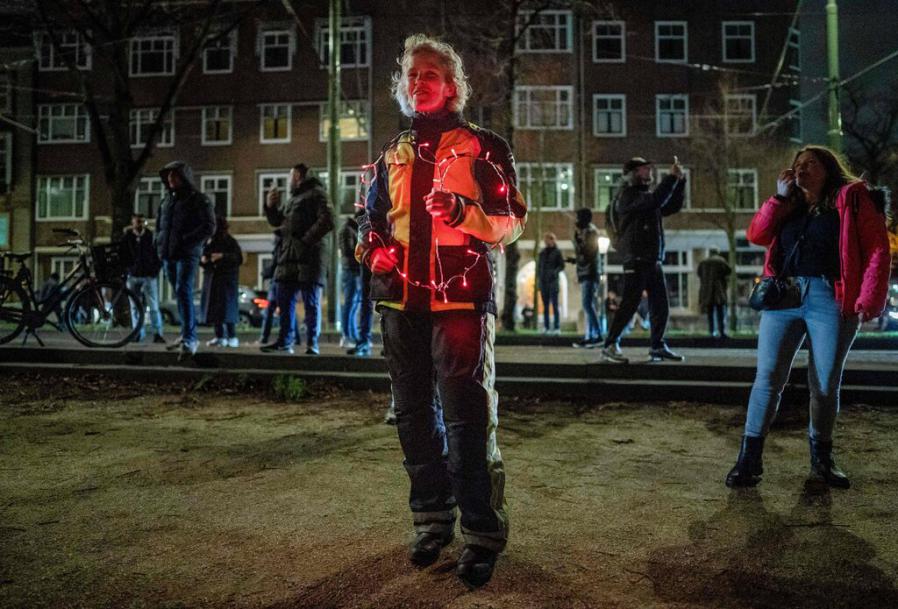
People blew whistles as they demonstrated outdside the Dutch prime minister’s office as he announced a five-week lockdown to slow the spread of coronavirus.Credit...Bart Maat/Agence France-Presse — Getty Images
Amid rising cases in the Netherlands, Prime Minister Mark Rutte ordered non-essential businesses to close for the next five weeks as protesters jeered his decision outside of his office in The Hague on Monday.
Mr. Rutte’s announcement came as other European leaders also ordered new restrictions over the holiday season, highligting the continent’s struggles to rein in the pandemic even as the vaccine provided new hope.
Mr. Rutte said that non-essential businesses, such as hair salons, gyms and museums would have to remain closed through Jan. 19. From Wednesday, all schools and universities will have to switch to remote learning. People may only host two visitors a day — three from Dec. 24 to 26 — according to the Guardian.
“We have to bite through this very sour apple before things get better,” Mr. Rutte said during a nationally televised address, according to the A.P. “The reality is that this is not an innocent flu as some people — like the demonstrators outside — think.”
Retrieved from: https://www.nytimes.com/live/2020/12/14/world/covid-19-coronavirus/the-dutch-prime-minister-orders-a-five-week-lockdown
Fiona Harvey Environment correspondent
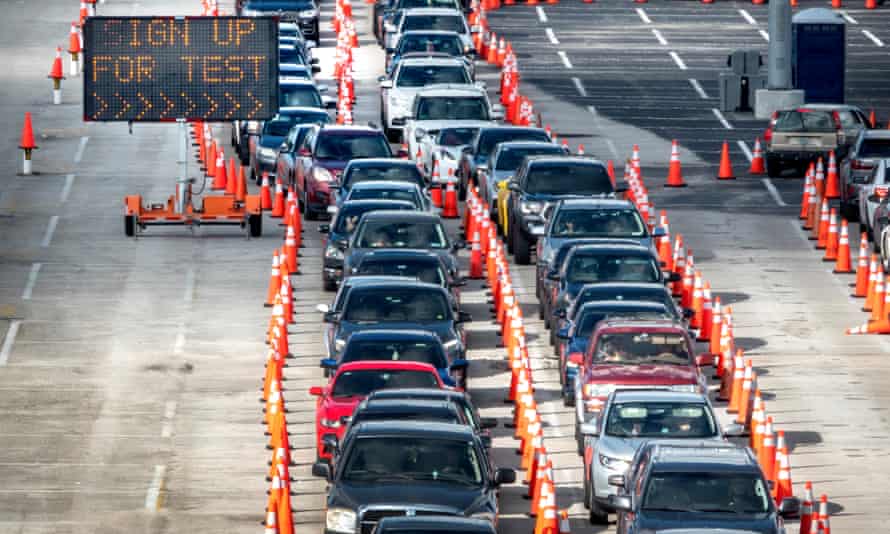
People queue in their cars to get to a coronavirus testing service in Miami, US. Photograph: Cristobal Herrera-Ulashkevich/EPA
Unless leaders make the right choices on recovering from the pandemic to avoid entrenching environmental problems and social inequalities, the world faces a future of lurching from crisis to crisis, reversing gains made in recent decades in health, education, social freedom and combating poverty, the UN has warned.
The unprecedented impacts of the coronavirus pandemic, combined with the environmental crises the world is facing, threaten to wind back human progress and development, leaving societies around the world vulnerable and more unequal, according to a new report from the UN development programme (UNDP).
Pedro Conceição, the director of the UNDP and lead author of its latest human development report, published on Tuesday, said governments were making such choices now, and they would affect societies around the world for many years to come.
“We are mobilising unprecedented fiscal resources to deal with the pandemic, and we can choose to make allocations in ways that add to inequalities, or in ways that reduce pressure on the planet,” he said.
These include stimulus packages that favour fossil fuels or add to unsustainable resource use, and spending that fails to address problems with health and education.
“These choices are being made as we speak,” he said. “The consequences are before our eyes. Climate change may seem remote to some people, but it is happening already, we see the evidence. We have no time to spare.”
The Guardian has found that countries are failing so far to fulfil promises they made to pursue a “green recovery” from the Covid-19 crisis, and are pouring money instead into propping up the existing high-carbon economy. Experts have warned that time is running out, as funds devoted to fossil fuels now will raise emissions for decades to come. Greenhouse gas emissions, which fell this spring as lockdowns gripped many countries, are already rebounding.
No country has ever reached a high level of material progress without inflicting a heavy cost on the planet, according to the UNDP report The Next Frontier: Human Development and the Anthropocene, marking the 30th anniversary of annual human development reports.
But if countries are judged by their carbon footprint and use of resources, and the harms these cause, then, according to the report, the progress that has been made to date in most of the rich world is wiped out by the existing and future damage caused to the ecosystems on which we rely, by our overweening use of resources and carbon emissions.
For 30 years, the human development report has concentrated not just on economics, but also measures of nations’ health, education and living standards. The new report takes in two new elements: material consumption and carbon footprints, to reflect the massive rise in resource use in recent years and the impact on the climate.
Jayathma Wickramanayake, the UN secretary general’s envoy for youth, said much of the burden of ecological damage would fall on young people: “While humanity has achieved incredible things, it is clear that we have taken our planet for granted.
“Across the world young people have spoken up, recognising that these actions put our collective future at risk. We need to transform our relationship with the planet – to make energy and material consumption sustainable.”
The pandemic also exacerbated existing inequalities, Conceição said. The human development report highlights the issue of women’s participation in the workforce in Mexico, Chile and Colombia. This had been on an upward trend, but has been reduced by 10 percentage points by the pandemic, reversing decades of positive change.
Economic and social inequalities have also been reinforced: access to healthcare has been restricted for many poorer people, as health systems around the world have been overwhelmed; and children, even in developed countries, who lack internet access or reliable electricity have missed on out on schooling when classes have been forced online.
Belinda Reyers, a director at the Stockholm Resilience Centre, who contributed to the human development report, said measures of human wellbeing and progress must take account of the environment, pressures on the planet, and the climate.
“Cascading crises like the coronavirus pandemic show that in our hyperconnected, rapidly changing world, environment and human development are no longer separate or separable. They are deeply intertwined,” she said. “Human development from now on is about making choices that are good for people and planet.”
Retrieved from: https://www.theguardian.com/environment/2020/dec/15/human-progress-at-stake-in-post-covid-choices-says-un-report
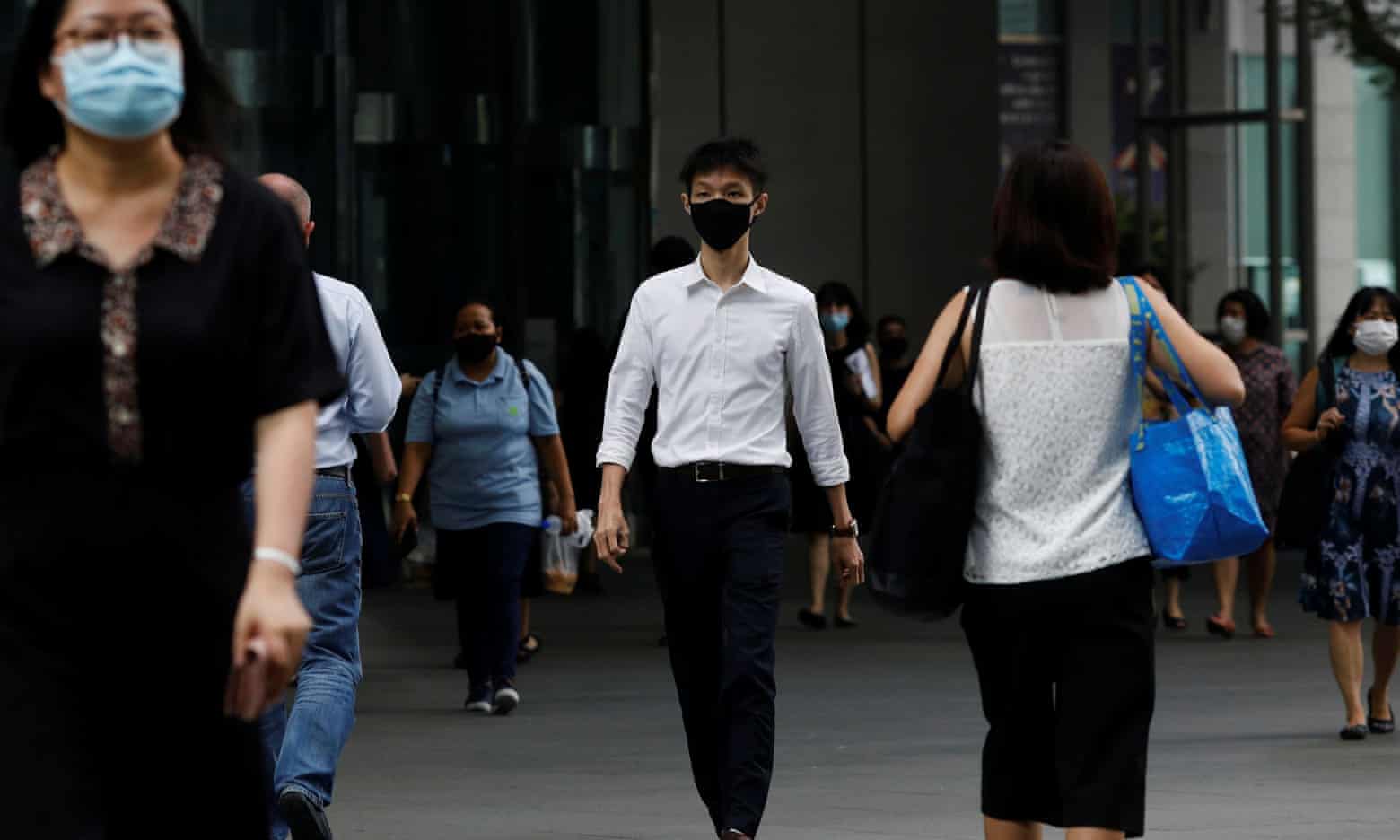
People wearing protective masks as a precaution against coronavirus walk during lunch hour at the central business district in Singapore, 14 December 2020. Photograph: Edgar Su/Reuters
Singapore will open a new segregated travel lane for a limited number of business, official and high economic value travellers from all countries, the government said on Tuesday, as part of efforts to revive its key travel and hospitality sectors, Reuters reports.
Singapore has spent billions of dollars in a bid to shield its economy from its worst-ever downturn and is trying to reopen international travel as it prepares to host the World Economic Forum’s annual gathering of political and business leaders next year.
The first travellers will be able to arrive from the second half of January through the new lane, which will be open to those who are coming for short-term stays of up to 14 days, the ministry of trade and industry said in a statement.
It will complement other arrangements that Singapore has for business travel including with China, Germany and Indonesia.
Travellers under the latest arrangement will have to stick to strict health and testing protocols, and will need to stay within a “bubble” at segregated facilities.
For example, while travellers will be allowed to meet with local visitors, there will be floor-to-ceiling dividers separating them.
Here are the key developments from the last few hours:
· Dutch prime minister announces five-week lockdown. Dutch prime minister Mark Rutte imposed a tough new five-week nationwide lockdown Monday, saying schools, nonessential shops, museums and gyms will close down at midnight until 19 January. “We have to bite through this very sour apple before things get better,” a sombre Rutte said in a televised address to the nation.
· A new strain of coronavirus that has shown up in England’s genomic surveillance in the past two months may have spread the virus in the south of England. The strain contains a number of different mutations and has been detected in parts of the south where cases of the virus are rising fastest, according to the health secretary, Matt Hancock.
· Moderna documents accessed in cyber-attack. Moderna Inc said on Monday it was informed by the European Medicines Agency (EMA) certain documents related to pre-submission talks of its Covid-19 vaccine candidate were unlawfully accessed in a cyberattack on the medicines regulator.
· South Korea’s prime minister pleaded with residents on Tuesday to abide by social distancing rules to avoid even greater restrictions in the face of the country’s largest wave of coronavirus infections. Daily infection rates are hovering at record levels with another 880 new cases reported as of midnight Monday, up from 718 a day earlier, the Korea Disease Control and Prevention Agency said.
· Canada kicked off its inoculation campaign against Covid-19 on Monday by injecting frontline healthcare workers and elderly nursing home residents, becoming the third nation in the world to administer the Pfizer/BioNTech vaccine.
· Singapore to open business travel bubble for all countries from January. Singapore will open a new segregated travel lane for a limited number of business, official and high economic value travellers from all countries, the government said on Tuesday, as part of efforts to revive its key travel and hospitality sectors.
· A record number of journalists were imprisoned during 2020, as governments cracked down on coverage of the coronavirus pandemic or tried to suppress reporting of civil unrest, the Committee to Protect Journalists (CPJ) said on Tuesday.